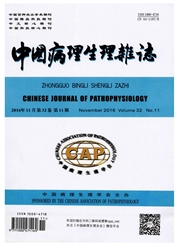

 中文摘要:
中文摘要:
目的:探讨RNA干扰(RNAi)技术在抑制NF-κB p65表达、调控LPS活化后巨噬细胞细胞因子表达中的应用。方法:利用阳离子脂质体将NF-κB p65小干扰RNA(siRNA)瞬时转染入Ana-1细胞,RT-PCR及Western blotting法检测其沉默效率,ELISA法检测LPS(1 mg/L)刺激下0 h、4 h、12 h和24 h Ana-1细胞培养上清中TNF-α、IL-1β、IL-6和IL-10浓度。结果:NF-κB p65 siRNA转染24 h后,NF-κB p65在基因水平及蛋白水平表达均被明显抑制(P〈0.05)。RNA干扰组Ana-1细胞培养上清中细胞因子TNF-α、IL-1β和IL-6表达在相应时点内均较对照组明显降低(P〈0.05),IL-10表达显著升高,在12 h和24 h差异显著(P〈0.05)。结论:体外实验初步证实RNAi技术能有效沉默小鼠巨噬细胞NF-κBp65基因的表达,下调其下游调控的促炎症细胞因子TNF-α、IL-1β、IL-6及上调抑炎症细胞因子IL-10的表达,从而抑制过度的炎症反应。
 英文摘要:
英文摘要:
AIM: To investigate the effects of chemically synthesized small interfering RNA(siRNA) targeting to NF-κB p65 expression on the production of inflammatory mediators in lipopolysaccharide(LPS)-activated mouse macrophage Ana-1 cells.METHODS: The siRNA targeting to mouse NF-κB p65 mRNA was transfected into Ana-1 cells and the rates of transcription and translation of NF-κB p65 were detected by RT-PCR and Western blotting 24 h after transfection.The cytokines(such as TNF-α,IL-1β,IL-6 and IL-10) in the supernatant of Ana-1 cells activated by LPS(1 mg/L) were measured by ELISA at 0 h,4 h,12 h and 24 h after transfection.RESULTS: The expression of the NF-κB p65 at mRNA and protein levels in Ana-1 cells was specifically and extensively suppressed by siRNA 24 h after transfection(P0.01).The levels of TNF-α,IL-1β and IL-6 in the supernatant of Ana-1 cells were cut down after transfection with NF-κB p65 siRNA in the interfering group(P0.05).In contrast,the level of IL-10 was increased,especially at 12 h and 24 h(P0.05).CONCLUSION: The technique of RNAi effectively silences the expression of NF-κB p65 gene in mouse macrophage Ana-1 cells,thus causes the decrease in the production of pro-inflammatory cytokines and the increase in IL-10 expression.
 同期刊论文项目
同期刊论文项目
 同项目期刊论文
同项目期刊论文
 期刊信息
期刊信息
